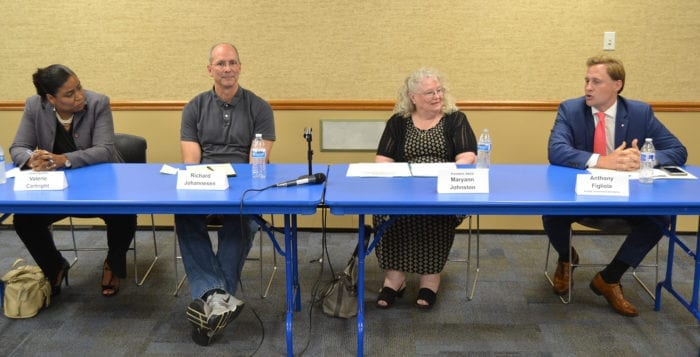Brookhaven Town has taken steps to change laws pertaining to terms of office for elected officials, but civically minded citizens are discussing it before jumping on board just yet. The Three Village Civic Association hosted a forum Sept. 4 at Emma S. Clark Memorial Library featuring four experts to discuss the proposal, which will appear on November’s ballot in the form of a referendum to be passed or failed by Brookhaven voters. Audience members came from as far afield as Medford and Patchogue.
The speakers included 1st District Councilwoman Valerie Cartright (D-Port Jefferson Station); Rich Johannesen, a veteran of local politics considered an expert in governmental workings, who helped lead a citizens initiative to establish council districts in the town more than 15 years ago; MaryAnn Johnston, president of the Affiliated Brookhaven Civic Organizations who also has seen more than her fair share of political races and policy discussions; and Anthony Figliola, former Brookhaven deputy supervisor and vice president of Empire Government Strategies, a company that provides strategic counsel on governmental relations and practices to municipalities.
Brookhaven’s board voted unanimously Aug. 2 to establish a referendum on the ballot Nov. 6 asking town residents to weigh in on changes to terms in office for elected officials, specifically increasing terms from two years, as is currently the law, to four years for councilmembers, the supervisor and highway superintendent, which would put it on par with the other Suffolk townships. The referendum will have a second component as part of the same, single “yea” or “nay” question: limiting officials to three terms in office. That component would impact the above positions, as well as town clerk and receiver of taxes. Both components will appear as part of a single proposition, according to Town Attorney Annette Eaderesto. If passed the law would go into effect for terms beginning Jan. 1, 2020.
In 1993, residents voted to implement a limit of three terms of four years each on elected officials, though that law was no longer applicable following a 2002 public vote to establish council districts since state law dictates councilmembers in towns with council districts serve two-year terms, according to Emily Pines, Romaine’s chief of staff and a former New York State Supreme Court justice, who spoke during the Aug. 2 town hearing.
Some of the speakers at the Sept. 4 civic forum took issue with Brookhaven’s interpretation that the law of the town isn’t already limiting elected officials to serving three terms, calling on politicians to solicit an opinion from the state attorney general. Others pointed to language which could allow sitting board members to start their term clocks afresh, despite having served several terms already on the board, as particularly objectionable. Some suggested the referendum felt rushed saying, waiting a year would ensure full community awareness about the town’s intentions.
Below are some of the comments from the civic association’s invited guests in a session moderated by the civic’s Herb Mones:
Johannesen: “I’m going to be very clear — I oppose four-year terms. The longer we allow elected officials to serve without putting them before us, the more likely it is that they are going to become corrupt. I think if you look at the history of corruption in this town and you look at the history of corruption in this county, one of the reasons why our elected officials have gone south is because there were no checks and balances. There hasn’t really been the kind of political diversity we were hoping for.”
Johnston: “The founders thought it was good enough for our congressmen to be two years; the state constitution provides for our assemblymen and our senators to be two years. And if the problem is raising funds for political campaigns, then the issue isn’t the length of term, because we have no guarantee they’ll ever stop raising funds and do it continually for four years. This is what the voters want: We chose councilmatic districts and the Town of Brookhaven fought us tooth and nail all the way down the line. And now they’re telling us that the 1993 referendum that we enacted was repealed by council districts. That’s not true. We already have term limits. It can’t be repealed by implication.”
Figliola: “To be perfectly candid, whether it’s two years or four years, you can’t legislate human conduct. So, if people are going to be corrupt, they’re going to be corrupt. I think that’s what prosecutors are for. It’s very hard to get elected if you’re a challenger unless it’s an open seat. It’s possible … but it’s difficult. That doesn’t have anything to do with corruption. I believe term limits can help, they can’t completely stop it, but can help because it will open up an opportunity for citizen legislators to be able to run. What this will do is, this will say ‘you have consecutively or nonconsecutively three four-year terms and then you’re out.’”
Cartright: “As you all know, two town board meetings ago, I voted in support of putting this on the ballot for a vote. This has been something that me and my colleagues have been discussing for quite some time — at least four years or so. I think this is an important discussion that needs to be had. Am I advocating one or another? I am not. I understand both sides. My personal opinion is that for good governance, I do think that four years would be better than two years, based on my experiences.”





